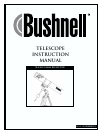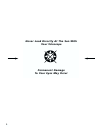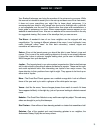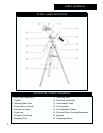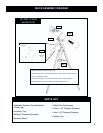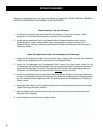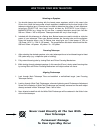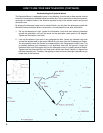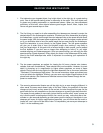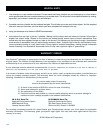
Never Look Directly At The Sun With
Your Telescope
Permanent Damage
To Your Eyes May Occur
❂
7.
Selecting an Eyepiece
1. You should always start viewing with the lowest power eyepiece, which in this case is the
20 mm lens. Note: the base power of each eyepiece is determined by the focal length of the
telescope objective lens. A formula can be used to determine the power of each eyepiece:
telescope OBJECTIVE lens focal length divided by EYEPIECE focal length =
MAGNIFICATION (e.g. Using the 20 mm lens, a sample calculation would look like this:
900 mm / 20mm = 45x or 45 power. Telescope models will vary in focal length.)
2. Included with this telescope is a Barlow lens. Barlow lenses are used to double or triple the
power of your telescope. Place your Barlow between the focusing tube and the eyepiece.
Using the example above, your 3x Barlow lens would give you a total power of 135x or
135 power. (45 x 3 = 135x or 135 power). The magnification calculation would look like this:
900 mm/ 20mm =45 power. 45 power x 3 = 135 power.
Focusing Telescope
1. After selecting the desired eyepiece, aim main telescope tube at a land-based target at least
200 yards away (e.g. a telephone pole or building).
2. Fully extend focusing tube by turning Rack and Pinion Focusing Mechanism.
3. While looking through selected eyepiece (in this case the 20 mm), slowly retract focusing tube
by turning Rack and Pinion Focusing Mechanism until object comes into focus.
Aligning Finderscope
1. Look through Main Telescope Tube and establish a well-defined target. (see Focusing
Telescope section)
2. Looking through Wide Field Finderscope, alternate tightening each Finderscope Adjustment
Screw until crosshairs of Wide Field Finderscope are precisely centered on the same object
already centered in Main Telescope Tube's field of view.
3. Now, objects located first with the Wide Field Finderscope will be centered in the field of view
of the main telescope.
HOW TO USE YOUR NEW TELESCOPE



